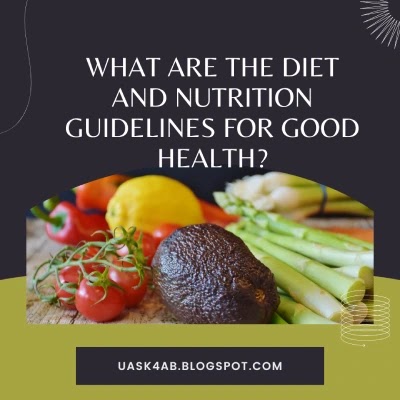What are the diet and nutrition guidelines for good health? Diet and nutrition guidelines recommend what to eat and how much to eat. These recommendations help people who need to lose or gain weight or maintain a healthy weight. The suggestions are based on scientific studies, which often use studies from different countries as a part of their research. They are the main guidelines which tell you how to maintain a healthy weight for your body. There are many factors that can affect your weight. These include the food, water and oxygen you consume each day.
Many people want to know the diet and nutrition guidelines because they want to know what they should eat, how they should exercise and where they can find the best healthy food alternatives.
What are the Diet and Nutrition Guidelines for Good Health?
A lot of people these days are eating unhealthy foods. The reason for this is that they don't know what to do or where to start with the nutrition guidelines. They look for answers about how to eat healthily and lose weight fast. When they're not getting results, they become discouraged and give up on their diet plan. In this post, we have put together some guidelines that will help you gain good health.
Eat a High-Quality Diet.
Nutrition is the science of foods and how we use them to keep our bodies healthy, but it's also the art of making food enjoyable.
It's not just about what you eat; it's also about the way you eat. Good nutrition is more than just a regimen for eating less and exercising more. It's about eating well-balanced meals that are complete and nutritious, as well as being physically active on a regular basis.
The most important thing when it comes to your nutrition is to eat a high-quality diet as a diet and nutrition guideline for good health.
A high-quality diet is a diet that is rich in essential nutrients, with a low content of calories, fat and sodium. The diet should be balanced and nutritionally complete. It can be obtained by eating a variety of foods, such as fruits, vegetables, legumes and whole grains.
A high-quality diet helps to prevent diseases such as heart disease and cancer by fighting against the symptoms caused by these diseases (inflammation). It also helps to reduce the risk of developing chronic diseases later in life by strengthening the immune system and improving overall health.
A high-quality diet is important for preventing obesity because it promotes weight loss when combined with a regular exercise program. A healthy lifestyle includes exercising regularly and eating a well-balanced diet that includes fruits, vegetables and whole grains.
Diet and nutrition are the most important aspects of a healthy life. A balanced diet can help you to maintain your health and to reduce your risk of many diseases, including cancer.
A balanced diet should provide all the nutrients that the body needs. It is also important to eat enough food so that the energy intake is sufficient for an active lifestyle.
A high-quality diet includes:
Sources of energy, such as carbohydrates from foods such as bread, potatoes, rice and pasta; protein from meat, fish and eggs; fat from dairy products or vegetable oils; vitamins and minerals from fruit and vegetables; fibre from whole grains.
Low-fat foods (less than 20% total energy). This means no more than 10% of your total energy intake is from fat.
Minimize Calorie Intake.
Minimize calorie intake as a diet and nutrition guideline for good health. In order to maintain good health, we need to be aware of the number of calories we consume each day. We also need to be aware of what those calories are and how they affect our bodies.
We all know that eating too many calories can lead to weight gain and obesity, but what do we mean by "too many" calories? The answer is: It depends on who you are and what your goals are. For example, if you have a specific goal (like losing 20 pounds) or if you're trying to achieve a healthy body weight for life (also known as maintaining), then you'll probably want to keep track of calories. But if all you want is to stay at the same weight forever, then it doesn't matter how much you eat or drink — as long as it's balanced with the right kinds of exercise. One of the most important rules in this regard is to avoid processed foods. Processed foods contain high levels of sugar, salt and fat. They are also often high in sodium, which can lead to high blood pressure.
The best way to eat healthy food is to prepare it yourself at home or when you are out and about. This will help you control portion sizes since you will be able to see how much food you are eating, and how much of it you need.
If you do not have time or the energy to cook at home, then try to buy frozen vegetables instead of fresh ones. Frozen vegetables are usually very low in calories but they still taste delicious!
A good way to reduce your calorie intake is by choosing whole grains over refined grains such as white bread and pasta products. Whole grain foods contain fibre which helps keep your digestive system working properly and helps prevent constipation. Fibre also helps reduce your risk of colon cancer, heart disease and diabetes by helping you feel full longer after eating meals containing carbohydrates (such as rice).
Maintain a Healthy Weight.
A healthy weight is one that is appropriate to your height and builds. A healthy weight is not necessarily the same as the ideal body weight that most people set for themselves or their doctors. The difference between a healthy weight and an ideal body weight depends on your age, gender, overall health, and activity level.
The best way to determine if you are maintaining a healthy weight is to look at your personal health history, physical activity levels, diet, and other factors. If you have any questions about your current weight or BMI, talk with your doctor or nutritionist.
The recommended range for healthy weight varies from one source to another. The World Health Organization (WHO) recommends that adult men should have a body mass index (BMI) of 18.5-24.9 kg/m² and adult women should have a BMI of 18.5-25 kg/m². This means that men should have a body mass index between 19 and 24 and women between 18 and 25. For children aged 5-18 years old, WHO recommends that boys should weigh between 8 and 10% more than girls do at the same age (nadir).
For adults who are not overweight but who are slightly underweight or obese, this guideline may be appropriate in order to maintain good health and prevent long-term health problems such as heart disease, diabetes and other conditions related to weight gain or loss.
The human body is a machine. It needs fuel to operate, and it needs fuel to stay running. When we don't keep our bodies healthy and properly nourished, they don't run well.
When you're eating the right foods, you'll feel energized and more fit than ever before. When you're eating the wrong foods, you could find yourself feeling sluggish, tired and out of shape.
The best way to keep your body in optimal condition is by following a balanced diet that includes all of the necessary nutrients for good health and fitness.
A balanced diet doesn't have to be complicated or time-consuming; it just means eating nutrient-dense foods that contain all of the essential vitamins, minerals and other nutrients your body needs for optimal health.
Excess Weight and Obesity are Linked to Many Health Problems
Excess weight and obesity are linked to many health problems including heart disease and stroke, diabetes, arthritis, and some cancers.
Obesity results from the combined effects of a person's genes, environment and behaviour. The genetic component is the greatest factor in determining whether someone will be overweight or obese. However, there are also many factors that influence how much weight people gain or lose. These include age, gender, ethnic group, family history of obesity and genetics.
Obesity can also increase the risk of developing certain diseases later in life, such as type 2 diabetes and certain types of cancer.
People with excess weight are more likely to have other health problems, such as high blood pressure, high cholesterol levels and heart disease.
The causes of obesity are complex but one factor that may play a role is the way in which our bodies process food in our digestive system.
Large amounts of fat stored in our fat cells can make us more susceptible to illness because they contribute to inflammation (a condition where the body's own tissues become inflamed), which can contribute to other diseases such as heart disease or diabetes.
The body has a biological drive for energy storage (also called "energy homeostasis") that causes it to store excess calories as fat when food is available in abundance — such as after overeating at a restaurant or during a holiday season. As the body's metabolism slows down with age, its ability to burn off fat becomes diminished. This condition is known as metabolic syndrome or Syndrome X.
The key to preventing obesity is finding ways to reduce caloric intake while increasing physical activity levels so that your body burns more calories than it takes in through food alone.
Eat Foods that are Low in Saturated Fats.
Eat foods that are low in saturated fats as a diet and nutrition guideline for good health. Saturated fat is primarily found in animal foods, and you should limit your intake of saturated fat to less than 10 per cent of your daily calories. You can maintain this level by choosing leaner cuts of meat and trimming excess fat from poultry.
In general, foods containing more than 2 grams of saturated fat per serving will raise your blood cholesterol levels. To lower your LDL cholesterol, choose foods that are high in monounsaturated fats (olive oil, canola oil and other vegetable oils) and polyunsaturated fats (fish oil).
Recommended: Eat more fruits, vegetables, whole grains and low-fat dairy products to help lower your cholesterol levels.
There is a growing body of research that suggests eating foods that are low in saturated fats can be beneficial for your health.
Saturated fat is found in foods such as butter, meat, lard, coconut oil and palm oil.
It's also found naturally in some plant-based foods like coconut and palm kernel oils.
The concern with saturated fats is that they tend to raise cholesterol levels in the blood, which can lead to heart disease and stroke.
Eating too much-saturated fat has been linked to an increased risk of heart disease and stroke.
However, eating foods high in unsaturated fats may actually be better for your heart health than eating saturated fats because they are less likely to raise cholesterol levels in the bloodstream.
Avoid Added Sugars in the Diet Except For Those Found Naturally in Fruits and Vegetables.
If you're trying to lose weight, avoid added sugars in the diet. Added sugars are a type of carbohydrate that comes from foods that have been processed or refined, or added during processing.
Added sugars can be found in many types of foods, including soda, sports drinks and breakfast cereals. They may also be present in candy and other desserts.
Added sugars can cause weight gain because they quickly convert into body fat once ingested by your body. This isn't true for natural sugars found in fruits and vegetables. Natural sugars don't cause weight gain because they don't contain calories and provide energy without causing insulin spikes (which can cause fat storage).
Added sugars are a problem for many people because they are hidden in foods that we think of as healthy. But added sugars can cause serious health problems and even death. Here's what you need to know about added sugars and how to avoid them.
Added Sugars Are Not Natural.
Added sugars are anything that is added by the manufacturer or baker to food products without being part of the original recipe. Common examples include table sugar (sucrose), high fructose corn syrup, dextrose, and maltose. Added sugars don't occur naturally in foods like fruits, so if you want to avoid them, you need to be careful about what you eat or drink.
Added Sugars Cause Weight Gain and Other Health Problems.
Added sugars can cause weight gain because they increase your appetite and make it easier to overeat. They also increase insulin resistance, which leads to type 2 diabetes and heart disease, among other health problems
Eat Foods With Plenty of Fibre.
Fibre is a form of carbohydrate that our bodies can't digest. It's found in plant foods like fruit, vegetables, whole grains and nuts. Fibre helps control hunger by slowing down stomach emptying and helping you feel fuller for longer.
The best way to get fibre is through eating fibre-rich foods such as wholegrain bread, cereals, pulses (such as lentils), fruits and vegetables. Fibre can also be found in legumes (beans and lentils). You can get fibre from some ready-to-eat cereals but these may have fewer nutrients than whole-grain options.
Drink Water Instead of Sugary Drinks.
Drinking water can help you stay hydrated, feel better and even lose weight. But it also has an unexpected benefit: It can help you avoid sugar cravings.
A recent study found that people who drank water instead of sugary beverages were less likely to crave sweets or salty snacks, even days later.
The researchers speculated that the association between water consumption and reduced cravings for sugary foods might be related to the fact that drinking plain water stimulates our appetite-regulating hormones as well as our digestive system.
In other words, following a daily habit of drinking two glasses of water may make you less likely to get hooked on sugar-sweetened drinks."
The most important thing that you can do to lose weight is to drink water.
Water is an essential part of your body, and it plays an important role in maintaining the balance of your body’s pH levels. Water helps your body function properly by flushing out toxins, removing waste from your cells, and providing a medium for nutrients to be absorbed into the bloodstream.
Water helps you feel full faster than other drinks, so it keeps you from eating too much at meals. It also helps you lose weight because it increases metabolism and causes the body to burn more calories when it metabolizes food.
But what about sugary drinks? Well, they’re not actually good for you either! Sugary drinks cause spikes in blood sugar levels which can lead to insulin resistance, type 2 diabetes and obesity.
When you drink soda, you're probably not aware of it. But the sugar in sodas is a big culprit in weight gain and diabetes. And soda isn't just bad for your waistline; it's also linked to heart disease, stroke and even dementia.
Of course, soda isn't the only source of added sugar. You'll find loads of it in processed foods: canned soup, breakfast cereals, fruit juices and candies. And don't forget about alcohol — we consume about 10 teaspoons (about 390 calories) of added sugar every day!
The good news is that there are plenty of healthy drinks out there — like water — that can help keep you healthy on the inside and out.
Choose Lean Proteins.
Lean proteins are good for your health because they are high in protein, which is a nutrient that the body needs to grow and repair itself. Lean proteins include chicken, turkey and fish.
Lean Proteins provide your body with the energy it needs to function properly. They also provide your body with the building blocks necessary for tissue repair and growth.
Proteins also play a role in keeping you feeling full long after you eat so that you don't overeat or feel hungry between meals.
Lean proteins are all about health, weight, and nutrition. They offer a complete protein source with all nine essential amino acids. They can be used to help you maintain or lose weight.
They are also rich in other nutrients such as vitamins and minerals, which play an important role in helping you get healthy.
Lean proteins are typically less processed than their fatty counterparts, so they contain more fibre, vitamins and minerals. They also tend to be lower in calories than other foods containing fats like meat and poultry.
Important of Lean Meat to the Body
- Helps maintain blood sugar levels and energy levels.
- Has been shown to help improve bone density.
- May reduce the risk of heart disease, cancer and type 2 diabetes.
- Helps build lean muscle tissue.
- Provides protein in pregnancy and breastfeeding mums.
Wrapping Up
This article is written to offer a good and healthy diet plan for your lifestyle, this helps you and other people to have a healthier lifestyle. Having a good healthy diet will help you live longer, and feel less fatigue than expected and since we are living in a fast-moving world like today trying to be healthy is one of the best bonuses we can have.
Good nutrition is crucial to maintaining good health and reducing your risk of developing a number of different diseases and conditions. Diet and nutrition play a big role in how well your brain functions, how well your body grows, how physically strong you are, how fast you can run, how healthy your skin is, and much more. But what exactly does that mean? What exactly should you be eating to live a long, healthy life? Look at the suggestions below for some helpful advice.
In essence, health begins with a proper diet. That's it. Of course, there's a bit more to it than that—such as staying active, not smoking, not drinking too much alcohol or other substances, etc.—but your diet really is the most important part of your health regimen.
RELATED POSTS

















.webp)

.webp)
